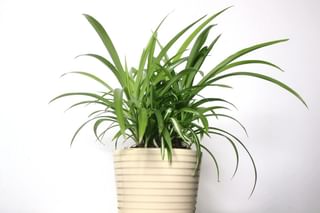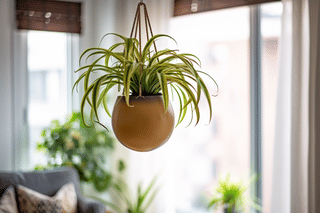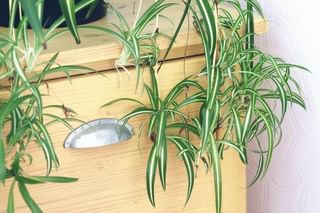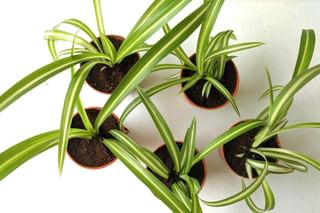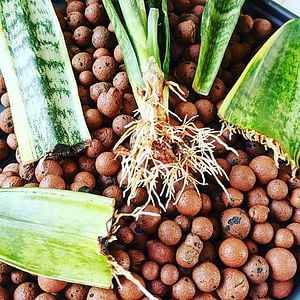The ultimate guide for Spider plants

If you love plants that instantly show you when they're not happy and give you a lot of baby plants very quickly, the spider plant is the perfect plant for you. This plant is very thirsty, so it's a perfect plant for those that overwater their plants. In this ultimate guide we'll go over how to care for a spider plant, how to propagate it, and how to eventually repot the plant.
To give you the best chance to take care of this plant, I've broken down the caring process into a few different steps. These steps give you the most in-depth information to teach you everything you need to know about caring for your plant.
-
How to care for a spider plant
-
How to propagate a spider plant
-
Everything about repotting a spider plant
1
. How to care for a spider plant
Back to the top
The spider plant is probably one of the easiest plants to take care of. In this post, we'll go over everything you need to know to take care of the spider plant and a few things you need to be mindful of when you're taking care of one of these plants. They're great for beginners and will show you great results very quickly.
Read "How to care for a spider plant"
2
. How to propagate a spider plant
Back to the top
Taking care of Spider plants is rewarding, because when done well, you grow baby spider plants. You can choose to propagate these. Find out how to propagate spider plants and grow more of them in a short period of time.
Read "How to propagate a spider plant"
3
. Everything about repotting a spider plant
Back to the top
Spider plants grow really quickly and need to repotted quite frequently compared to other plants. It's complicated, but there are a few good things to know before you do this. In this guide, we'll go over everything you should be mindful of when repotting spider plants.
Read "Everything about repotting a spider plant"
In this ultimate guide to taking care of a Spider plant, we've split the entire process into smaller chunks, so you don't get overwhelmed with information. Each of these guides can be used separately and will become useful in different stages of your caring process.
Scientific classification of Chlorophytum comosum
Plants go by many names, but it can become confusing very quickly if you're talking about different plants with the same nickname. That's why I'm including the scientific name of the plant, so we're all on the same page!
|
Classification
|
Name
|
|
Species
|
Chlorophytum comosum |
Frequently asked questions
How should you water the Spider plant?
The Spider plant thrives in moist (no wet) soil, so make sure to regularly check the soil to see if you need to water it again.
How much sunlight does the Spider plant need?
The Spider plant does best in a spot where it gets bright, indirect sunlight. This spot is always bright but never gets direct sunlight.
How much fertilizer does the Spider plant need?
The Spider plant needs quite a bit of energy to grow, so you should fertilize it once per month in the spring and summer.
What is the best soil for the Spider plant?
The Spider plant likes to be watered when the top of the soil is dry, so use a soil mix that drains excess moisture quickly and holds onto some moisture for a few days.
What is the ideal temperature for the Spider plant?
The Spider plant prefers a spot that consistently stays between 18 - 32°C (64 - 89°F).
How do you propagate the Spider plant?
To propagate the Spider plant, you can take cuttings from the parent plant. Often, you cut part of the stem of the Spider plant and plant that in moist soil.
How often should you repot the Spider plant?
You should repot your Spider plant once every 1 year(s). This helps your Spider plant to stay healthy for many years.
Is the Spider plant easy to take care of?
The Spider plant is easy to take care of and great for beginners.
Didn't find what you were looking for?
We have resources about other plants and plant-related topics as well.
Perhaps these resources contain the information you're looking for.
I've written a lot of guides about all kinds of aspects of taking care of plants, but I could've missed that specific topic you were looking for. If that's the case, you can request a plant guide. This way I can provide you with the information you need quickly and you won't have to wonder if you're taking care of your plant properly anymore.
